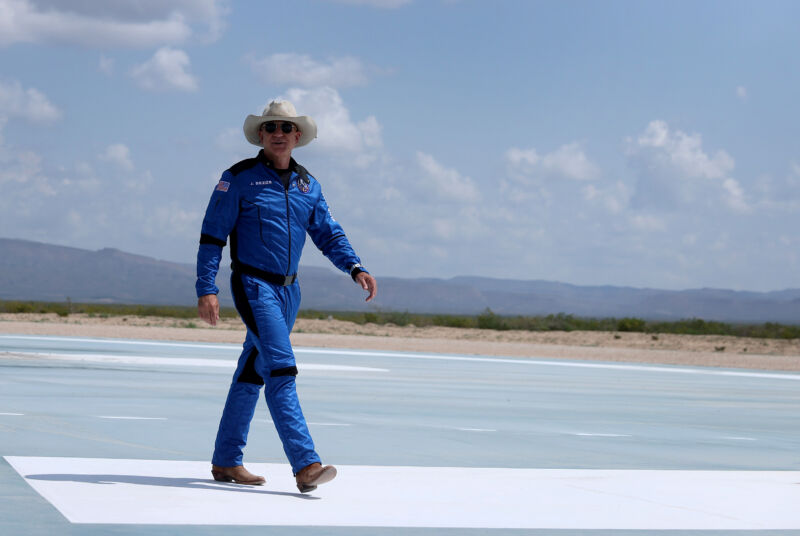
Virgin Galactic smoothly completed its sixth human spaceflight in six months on Thursday, continuing an impressive cadence of missions with its VSS Unity spacecraft. This performance has made the company the clear leader in suborbital space tourism.
A key question is where this leaves the other company with a launch system capable of carrying private astronauts above the atmosphere: Blue Origin. That company's New Shepard rocket and spacecraft have been grounded since an engine failure nearly 14 months ago. During that uncrewed flight, the rocket broke apart, but the capsule safely parachuted to the West Texas desert.
Blue Origin finished its accident analysis this spring and implemented a fix to the issue, including design changes to the BE-3 engine combustion chamber. In May, the company said it planned to return to flight "soon." Then, in September, the Federal Aviation Administration closed its mishap investigation. So where is New Shepard?
The company originally targeted an uncrewed return-to-flight mission in early October, two sources told Ars. This flight was to carry the scientific experiments on board the ill-fated New Shepard-23 to give them a second opportunity to try to reach space and undergo microgravity conditions. Assuming all went well, a crewed mission was to follow in February 2024.
However, October has come and gone. Asked when New Shepard will launch, a Blue Origin spokesperson told Ars, "We’re preparing for flight and plan to return later this year."
That is consistent with what some members of the Blue Origin team are now working toward. The most recent delay, according to a source at the company, was caused by an issue with certifying an engine part intended for flight.
It is too strong to characterize the New Shepard rocket and spacecraft as a vanity program for Blue Origin and its founder, Jeff Bezos. After all, the company has learned some valuable lessons about vertical landing and rocket reuse that it will apply to the much larger New Glenn rocket. However, after New Shepard gave Bezos his much-desired ride to space in 2021, it's worth contemplating the purpose of the program going forward.
Does New Shepard have a future?
Of Blue Origin's approximately 11,000 employees, about 400 people spend part or all of their time working on New Shepard. That is a small fraction of the company's overall workforce, but factoring in salaries, benefits, and programmatic expenses, a reasonable estimate is that New Shepard costs Blue Origin about $100 million a year to maintain and operate.
Prior to the accident, the program averaged a flight roughly every eight to 10 weeks. Even doubling that cadence, it is very unlikely that New Shepard would come close to being revenue-neutral. As one person familiar with the company's finances told Ars, "It's definitely a money loser. Always has been." Another person told Ars that New Shepard is "hemorrhaging" money.
New Shepard is just one of many lines of business being pursued by Blue Origin. There is competition within the company for resources to build engines, big rockets, lunar landers, and even a space station. At Virgin Galactic, there is only suborbital space tourism. In other words, Blue Origin could end New Shepard and still be a major space company. At Virgin, it's the whole enchilada.
In December, a new chief executive will take the reins at Blue Origin, an Amazon veteran named Dave Limp, who has Bezos' trust. When he was hired, Bezos gave Limp a clear mandate: move faster. In particular, Bezos wants Blue Origin to deliver on the large New Glenn rocket and lunar lander for the Artemis Program. One way to cut costs and move faster would be to take the talented and experienced engineers on New Shepard and allocate them to the rocket and lander programs.
It's impossible to know what is in Bezos' mind, of course. Ultimately, it will be his decision about whether New Shepard continues to fly. The program, which is managed in Washington state and flown out of West Texas, will last as long as he cares to subsidize it. But it is perhaps notable that Bezos just announced he is moving from Washington to Miami. Florida has no capital gains taxes (which is important when you're selling Amazon stock to fund Blue Origin on the regular), his parents are there, and his partner Lauren Sanchez loves the beach.
Miami is also closer to Cape Canaveral, where the action is for Blue Origin's rocket and lunar lander activities. "Blue Origin's operations are increasingly shifting to Cape Canaveral," Bezos wrote on Instagram.
And it is pretty far from West Texas.
Reader Comments (82)
View comments on forumLoading comments...